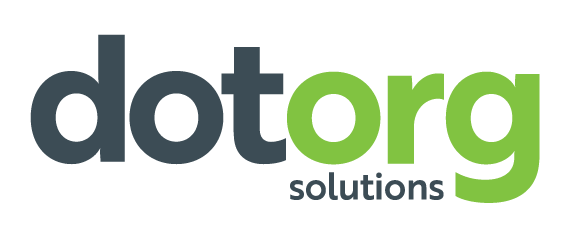Five things nonprofits should consider when planning for 2020
Note from Amy: There is an endless amount of information available to nonprofits and we know how hard it is to get through it all, let alone use it to improve your organization. Our Dot Org Solutions team spends a great deal of time researching and watching trends in the nonprofit sector to guide and provide insight to our clients and readers like you who want to learn more. We are grateful to all the organizations that provide essential data that helped me compile the content for this blog. Their commitment to the success of the nonprofit sector makes the world a better place for all of us.
It may seem like it is a little soon to be planning for 2020. But summer is rapidly speeding by and budget and goal-setting season will be here before you know it.
The thought of planning for next year is probably the last thing on your mind. In fact, the thought of planning any time of year for anything may be daunting. You and your team may be struggling just to get the regular, day-to-day stuff done. Your resources may be limited, the demand for services is high and board/staff challenges crop up daily.
But, we’re big fans of plans here at Dot Org Solutions and know that taking time to develop them pays off in the long run. (Read our director of nonprofit consulting, Sara Lundenberger’s, blog on annual fund planning, where she talks about the importance of making plans.) Planning is the best way to manage the day-to-day, deal with unexpected challenges and grow your organization.
As you start to think about 2020, there are five things I suggest that your nonprofit consider when developing goals, objectives and strategies.
⋅ Giving data⋅ Staff retention and recruitment
⋅ Technology
⋅ Cybersecurity
⋅ Sustainability
Giving data
The annual Giving USA report provides excellent information on giving trends and data from the prior year. According to the 2019 Report on Giving that was released in June, there were key findings that should be factored in when setting financial goals for fundraisers and for philanthropic revenue.
Some of the key highlights include:⋅ Total giving was virtually flat compared to the preceding year.
⋅ Giving by foundations and corporations saw healthy growth.
⋅ Bequests were flat, and
⋅ Contributions from individuals declined.*
*Giving USA: The Annual Report on Philanthropy for the Year 2018 (2019). Chicago: Giving USA Foundation.
So far, in 2019, several studies are showing reductions in giving. In addition to setting realistic goals based on projections and this data, organizations must find ways to continue to connect with current donors, develop relationships and show the impact that gifts make on their organizations.
Staff retention and recruitment
There is no question that the workforce is aging and that the job market is very good for job seekers. This creates challenges for organizations who are facing retirements from executive leadership and have jobs to fill in key areas like fundraising, which have a limited number of qualified candidates.
Organizations will have to consider succession planning, adapt to a more tech-savvy workforce and invest in professional development opportunities for younger workers who are smart and ambitious, but may not have the exact skills upon hire.
Nonprofits will also have to be adaptable to a workforce who seeks more balance than their elders. They will have to consider remote work opportunities. Compensation will also be a key component in a tight labor market where young people also have significant student loan debt to pay off.
Technology
Capturing data and maintaining it, plus staying on top of technology changes, will be important to address, as well. Make sure you have a quality donor database, along with the policies and personnel to properly enter/update information. Quality data saves time and money by giving you accurate information at solicitation time, helping you stay better connected with donors for the long term and giving you the information needed for reporting.
Don’t forget your website, either. Yes, a new website is an expense, but if yours is built on old technology or hasn’t been updated in a while, you leave yourself vulnerable to outside attacks, which could shut you down. Also, donors and your clients use their phones for much of their research. If your site isn’t mobile responsive, it is difficult to provide information on services or accept donations.
Cybersecurity
Remember that important donor data I mentioned earlier? Make sure you keep it safe along with any other data and files within your organization. Nonprofits are popular targets for spamming, spoofing, phishing and ransomware.
Educate your staff on what to look for. The bad people are VERY savvy. They pretend they are a CEO or someone in authority to get valuable information. They spoof email addresses to trick you into clicking on a link. And they will even hijack emails from someone else to try to get bank routing numbers for payment. (All three have happened to us and our clients.)
Also, consider getting cybersecurity insurance. Get an audit of your systems by a trained cybersecurity firm. And always, always be vigilant. If a data breech happens to you, it is not only a PR concern for your organization, but often there are privacy concerns that impact protected health information. If there is a breach, make sure you hire a quality IT firm to mitigate the IT damage and a PR firm (like Dot Org) to help you navigate communications challenges.
Sustainability
I believe that if you can’t sustain something, it’s not worth doing it in the first place. So, whatever plans you develop, make sure that you have the resources (staff, volunteers, budget) to implement them and sustain them for the long term.
Have a strategic plan and align your marketing and fundraising with it. Diversify your revenue, so that you aren’t reliant on any one area (grants, corporate, program income). Consider what cost savings you can make. A merger or partnership may make sense. Share space or services with another nonprofit to cut down on supply, rent or utility costs. Look at paring back staffing and programs to help balance the budget.
You may not be ready to develop your plan for the next year. However, we believe plans and preparation ultimately lead to success. When you do develop your plan, make sure to consider the five points addressed in this blog.
And, of course, if you want to learn more best practices for your nonprofit, contact us. We can guide you along the way.
Like what you read? Subscribe to our weekly blog and it will be delivered directly to your inbox!
Giving USA and the Giving USA Foundation
Giving USA is a public outreach initiative of Giving USA Foundation. The Foundation, established in 1985 by what is now The Giving Institute, endeavors to advance philanthropy through research and education.
Giving USA: The Annual Report on Philanthropy for the Year 2018 is a 2019 copyright of Giving USA Foundation and is researched and written at the Indiana University Lilly Family School of Philanthropy.
No portion of this publication may be reproduced, whether in print or electronic form, without the written permission of Giving USA Foundation.
Speakers may cite Giving USA. Use of Giving USA’s data or other material in presentations, texts, online format, or other contexts must credit Giving USA as noted in the above sections in a prominent fashion.

Amy Wong, president, Dot Org Solutions
Amy believes the world is a better place because of the special work that nonprofits do for our communities for making them better places to live, work and raise families. And as president of Dot Org Solutions, she is a champion for small businesses for the role they play in creating jobs, delivering important products and services, and keeping the economy strong.

